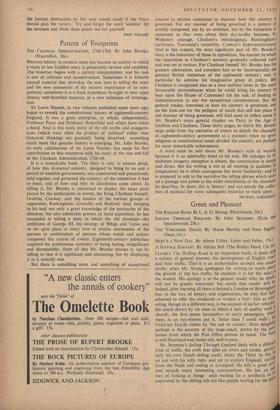Pattern of Footprints
THE CHATHAM ADMINISTRATION, 1766-1768. By John Brooke. (Macmillan, 36s.) WRITING history in modern times has become an activity in which a more or less familiar story is perpetually revised and modified. The historian begins with a current interpretation; and his task is one of criticism and reconstruction. Sometimes it is hitherto unused material that provokes the new turn in telling the story and the new assessment of the relative importance of its com- ponents; sometimes it is a fresh hypothesis brought to bear upon already well-thumbed material, or a new technique of investiga- tion.
Sir Lewis Namier, in two volumes published some years ago, began to rework the constitutional history of eighteenth-century England. It was a great enterprise, in which, independently, Professor Pares and Professor Butterfield and others have taken a hand. And in this work many of the old myths and exaggera- tions (which were often the product of `political' rather than historical thinking) are gradually being dissolved : something much more like genuine history is emerging. Mr. John Brooke, an early collaborator of Sir Lewis Namier, has made his first contribution to this enterprise with his study of the rise and fall of the Chatham Administration, 1766-68,
It is a remarkable book. The story is told, in minute detail, of how this ill-starred ministry, designed to bring to an end a period of unstable governments, was constructed and precariously held together and governed the country; of the opposition it had to meet; and of how and why its dissolution came about. In telling it, Mr. Brooke is concerned to display the exact parts played by the participants in events, the King, Chatham himself, Grafton, Conway, and the leaders of 'the various groups in opposition, Rockingham, Grenville and Bedford. And, bringing to his task not only a great knowledge of the intricacies ofthe situation, but also admirable powers of lucid exposition, he has succeeded in telling a story in which the old absolutes—the ambitions. of George III, the strategy of Whigs and Tories and so on—give place at every turn to precise assessments of the persons or combination of persons whose words and actions composed this course of events. Eighteenth-century politicians acquired the posthumous notoriety of being boring, insignificant and disreputable: from all this Mr. Brooke rescues it, not by telling us that it is significant and interesting, but by displaying it as it actually was.
But there is something more and something of exceptional
interest to anyone concerned to discover how this country is governed. For our manner of being governed is a pattern of activity composed, not by an architect, but by the footprints of statesmen as they went about their day-to-day business, by Walpole's courage, Chatham's intransigence, Rockingham's feebleness, Townsend's instability, Conway's hypersensitiveness. And in this respect, the most significant part of Mr. Brooke's story is the behaviour of those in opposition, the manner in which the opposition to Chatham's ministry gradually collected itself and was set in motion. For Chatham himself Mr. Brooke has the greatest admiration, and considers him to be 'incomparably the greatest British statesman of the eighteenth century'; and in particular he admires his imaginative grasp of policy. Bia Chatham is recognised also as a man unfitted (even in the more favourable circumstances when he could bring his oratory to bear upon the House of Commons) for the task of leading all Administration in any but exceptional circumstances. But the general reader, interested in how his country is governed, and on the look-out for the pedigree of much that still has place in our manner of being governed, will find most to reflect upon in Mr. Brooke's more general chapter on Party in the Age of Grafton and Chatham. These thirty pages, in which Mr. Brooke steps aside from the narrative of events to sketch the character of eighteenth-century government at a moment when no great religious or constitutional issues divided the country, are perhaps his most remarkable achievement.
A word must be said about Mr. Brooke's style of writing. because it is so admirably fitted to his task. He indulges in 110 elaborate imagery, metaphor is absent, the construction is simple and direct. But his writing is not at all wanting in qualities of imagination; he is often courageous but never foolhardy; and he is prepared to add to the narrative the telling phrase which su its up a passage and points to the wider entafintents of the situations he describes. In short, this is 'history' and not merely the cone' tion of material for some subsequent historian to work upon. MICHAEL OAKESHCIT










































































 Previous page
Previous page